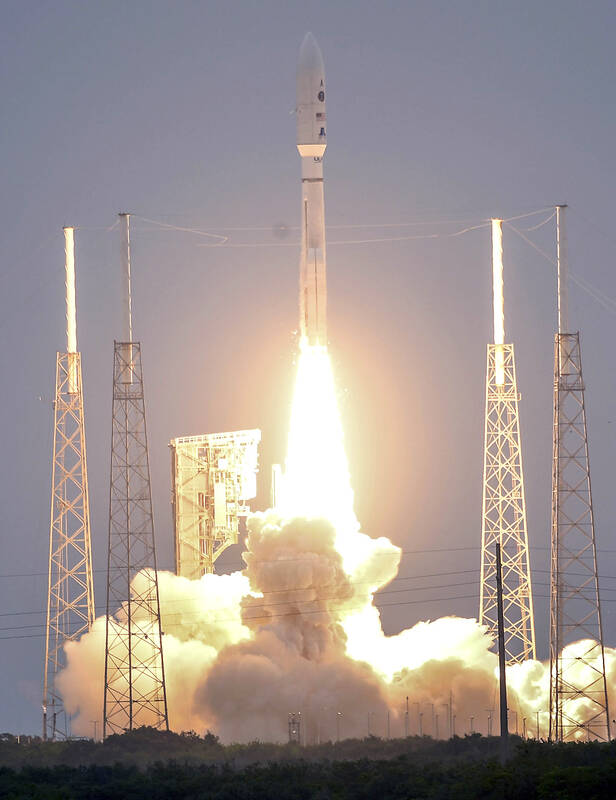US defense contractor L3Harris Technologies Inc on Sunday said it would purchase Aerojet Rocketdyne Holdings Inc in a US$4.7 billion all-cash transaction, as it looks to tap into rising demand for missiles amid the Ukraine conflict.
The offer price of US$58 per share represents a premium of 6.5 percent to Aerojet’s close on Friday.
The deal, which is expected to be completed next year, would add to L3Harris’ Space & Airborne Systems unit, which makes electronic warfare equipment and avionics sensors.

Photo: AP
Reuters last month reported that L3Harris, formed by the merger of L3 Technologies and Harris Corp in 2019, was among the companies vying to buy Aerojet, which put itself up for sale after antitrust regulators blocked a merger with Lockheed Martin Corp earlier this year.
The US has assisted Ukraine with billions of US dollars in military aid, including missiles and air defense systems, driving up demand for missiles as allies also seek to boost their defenses.
Aerojet develops and manufactures liquid and solid rocket propulsion and hypersonic engines for space, defense, civil and commercial applications.
The market for rockets has also received an incentive from NASA, one of Aerojet’s main customers, which is pursuing moon and deep space missions with renewed vigor.
Aerojet makes the RS-25 engines for NASA’s launch vehicle, as well as the RL10 engines that power launch vehicles made by United Launch Alliance, a joint venture between Boeing Co and Lockheed Martin.
L3Harris, which has been investing in the space and cyberindustries, is looking to solidify its position among top aerospace and defense firms as one of the leading contractors to the Pentagon.

Vincent Wei led fellow Singaporean farmers around an empty Malaysian plot, laying out plans for a greenhouse and rows of leafy vegetables. What he pitched was not just space for crops, but a lifeline for growers struggling to make ends meet in a city-state with high prices and little vacant land. The future agriculture hub is part of a joint special economic zone launched last year by the two neighbors, expected to cost US$123 million and produce 10,000 tonnes of fresh produce annually. It is attracting Singaporean farmers with promises of cheaper land, labor and energy just over the border.

US actor Matthew McConaughey has filed recordings of his image and voice with US patent authorities to protect them from unauthorized usage by artificial intelligence (AI) platforms, a representative said earlier this week. Several video clips and audio recordings were registered by the commercial arm of the Just Keep Livin’ Foundation, a non-profit created by the Oscar-winning actor and his wife, Camila, according to the US Patent and Trademark Office database. Many artists are increasingly concerned about the uncontrolled use of their image via generative AI since the rollout of ChatGPT and other AI-powered tools. Several US states have adopted

A proposed billionaires’ tax in California has ignited a political uproar in Silicon Valley, with tech titans threatening to leave the state while California Governor Gavin Newsom of the Democratic Party maneuvers to defeat a levy that he fears would lead to an exodus of wealth. A technology mecca, California has more billionaires than any other US state — a few hundred, by some estimates. About half its personal income tax revenue, a financial backbone in the nearly US$350 billion budget, comes from the top 1 percent of earners. A large healthcare union is attempting to place a proposal before

KEEPING UP: The acquisition of a cleanroom in Taiwan would enable Micron to increase production in a market where demand continues to outpace supply, a Micron official said Micron Technology Inc has signed a letter of intent to buy a fabrication site in Taiwan from Powerchip Semiconductor Manufacturing Corp (力積電) for US$1.8 billion to expand its production of memory chips. Micron would take control of the P5 site in Miaoli County’s Tongluo Township (銅鑼) and plans to ramp up DRAM production in phases after the transaction closes in the second quarter, the company said in a statement on Saturday. The acquisition includes an existing 12 inch fab cleanroom of 27,871m2 and would further position Micron to address growing global demand for memory solutions, the company said. Micron expects the transaction to